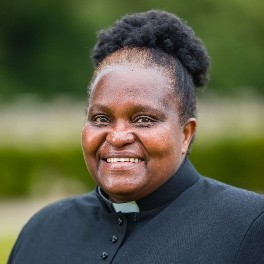 A Black History Month Reflection By The Revd Mahalha Wachepa, Team Vicar (Billingham Team Parish)
A Black History Month Reflection By The Revd Mahalha Wachepa, Team Vicar (Billingham Team Parish)
"So, God created mankind in his own image, in the image of God he created them; male and female he created them." (Genesis 1:27)
This verse highlights the creation of humanity in the likeness of God, affirming both male and female as reflections of His divine image. Unlike other creatures, all humans are created in God’s image and likeness, set apart and given a special place in creation.
It provokes a reminder that differences in gender, skin colour, physical differences or social status do not alter the fundamental truth of God’s creation and should not be a reason for division. The image of God within humans enables us to have a unique relationship with God. In his eyes, there are no superiors or inferiors.
It is written in Acts 10:34-35
"Then Peter began to speak: 'I now truly understand that God does not show favouritism but welcomes those from every nation who fear Him and do what is right.'".
Here, we are reminded that God’s grace extends equally to all people, regardless of their nationality, background, or skin colour. God accepts individuals from all nations who act righteously before Him.
As a minority, I am reminded not to act differently from what God has called me to be. My identity is not defined by how society sees me but how God sees me. God does not treat me differently because of my race or background – I am His child, just like everyone else. Before God, all of us are called to righteousness.
As a follower of Christ, I would love to encourage everyone to embrace reconciliation and unity, breaking down walls of division and walking together in love of Christ.
Just as it states in Ephesians 2:14-16 :
"For Christ himself has brought peace to us. He united Jews and Gentiles into one people when, in his own body on the cross, he broke down the wall of hostility that separated us. He did this by ending the system of law with its commandments and regulations. His purpose was to create in himself one new humanity out of the two, thus making peace.".
This passage emphasises the reconciliation and unity Christ brings between different groups, showing how His sacrifice brings an end to division and the creation of a new community. In the pursuit of harmony and togetherness among diverse people, Scripture offers both wisdom and direction.
It reminds us of the transformative nature of Jesus’ sacrifice and His power to break down barriers. That creates the importance of embracing and celebrating diversity, ultimately laying the foundation for a more inclusive and harmonious society. As we reflect on the biblical call to racial reconciliation, we are encouraged to consider how these teachings can be lived out within our own lives and communities today.
As Christians, we are called to confront and heal the deep wounds caused by racial division whilst fostering genuine unity among individuals of different racial background. By embracing diversity and promoting equality, we take steps toward shaping a more just and harmonious world for all.
According to the Bible, reconciliation is rooted in the restoration of broken relationships and the healing of divisions. It goes beyond passive tolerance and calls for intentional efforts to address the pain caused by racial and social divides. The Bible teaches us that reconciliation lies at the very heart of God’s plan for humanity, underscoring the importance of love, forgiveness, and mutual understanding. When we live out these biblical principles, we help create a more united and inclusive community that reflects God’s kingdom.
